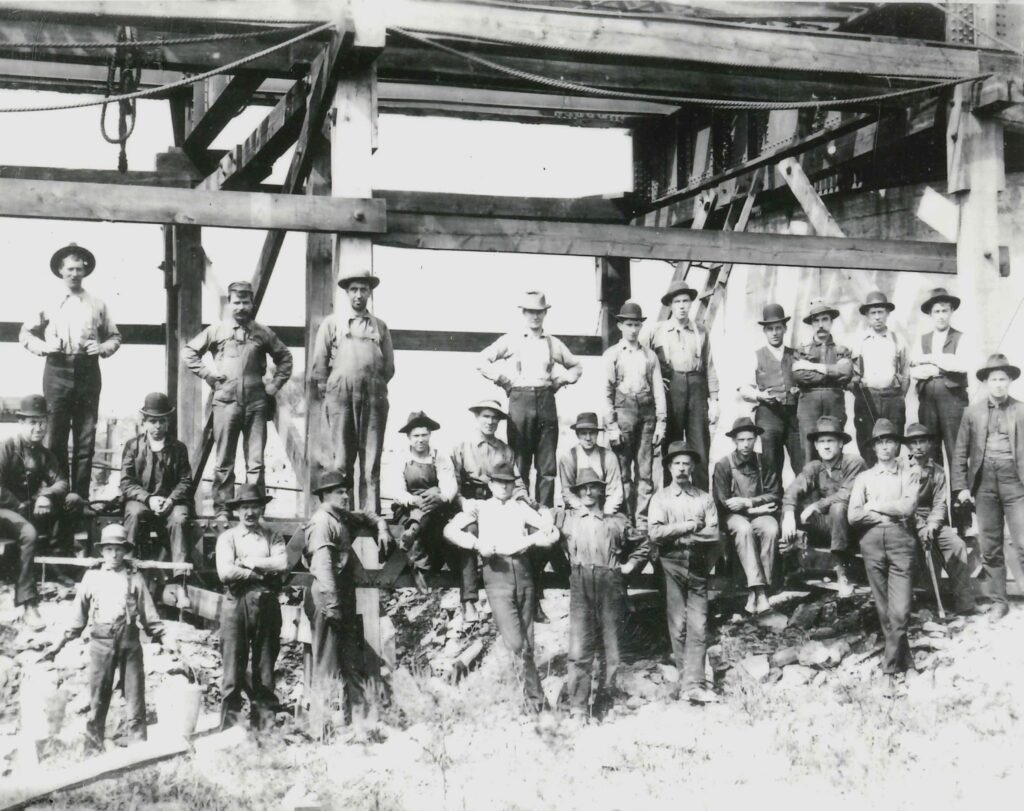Policemen of the Ditch, it wasn’t easy

By Sandy Vasko
In 1894, a project known as the Sanitary Canal, or the Big Ditch, was in full swing. This project employed the best engineers of the time. Their goal was to funnel water from the Chicago River, along with the sewage, into the new canal and then into the Des Plaines River.
Like the I & M before it, it was divided into sections, with each section having a different contractor. Those contractors were responsible for housing the labor force, feeding them, but not for keeping the peace. For that, special policemen were hired. Today, we look at the life of a policeman on the Big Ditch.
From May 4, 1894, Joliet News: “Madman at the Ditch – The farming neighborhood just west of the canal, not far from the home of J. H. Alexander, was in a state of great excitement Wednesday. A man in the employ of J. T. Kerman, a farmer, suddenly became deranged and getting possession of a huge knife started for his employer’s house where Mrs. Nellie Kerman and a sister were. Rushing up to the door he saw Mrs. Kerman standing a short distance away and seized her by the arm, at the same time raising the knife to plunge it into her bosom.
“Before he could carry out his murderous intent the sister uttered a cry and attracted his attention. The interruption enraged Jacobi. With an oath he threw Mrs. Kerman from him and sprang toward her sister, who ran from the house and succeeded in eluding Jacobi among the out buildings. He made no further attempt on the lives of the women, but secreted himself in the basement.
“The screams of the frightened women and the oaths of the maniac aroused the neighborhood and several police from the ditch were soon on hand. One of the officers went into the cellar after the man and found him crouched in a corner. Again, there was excitement in the air for the fellow sprang forward and bunted the officer in the face, knocking him nearly senseless, and bounded through the door with a large crowd of farmers in pursuit. Numerous shots were fired but the man would not give up till he was run down and severely clubbed.
“Upon examination it was found the man’s name was W. W. Jacobi. His face was badly cut and a charge of shot had taken effect in his head. The officers took him to the jail that evening as he was not able to furnish bail for his appearance before the grand jury. All night the man paced his cell and kept it up ever since. He is undoubtedly insane.”
Our next incident is from June 1, 1894 Joliet News:
“Monday evening about half past 10 o’clock Officer Kelly of the drainage police heard cries for help from the vicinity of the old canal near the bridge at Romeo. On proceeding to the spot he found a man clinging to the ragged edge. He was pulled out and said he had been thrown in by three men who ran north after committing the deed. Sergeant Boen detailed four officers on the case but could find no clue.”
From September 7, 1894 Joliet News: “As the result of a coroner’s inquest held on the body of John Hogan, at St. Joseph’s hospital August 31, two Italians from the drainage district near Romeo are behind bars of the county jail, held without bail on the charge of murder.
“The prisoners are Barologo Bredjelo and Mrs. Ellen Fellicies. They were arrested on a warrant sworn out by one of the drainage police. The trouble occurred in a saloon of the moonshine order, conducted by the two near Romeo. Hogan had been drinking in the place and a dispute arose over the payment of some drinks. As a result, a murderous revolver was discharged, fatally wounding Hogan.
“He was brought to St. Joseph’s hospital, where he died yesterday. The woman before the coroner’s jury said she fired the fatal shot, and the man seemed inclined to let her bear the brunt of the trouble, but the coroner’s jury considered both guilty, and held them without bail. Mrs. Fellicies’ husband was drowned in the canal a few months since.”
From September 14, 1894 Joliet News, we read another view of the police force: “A colored man from the drainage ditch was in the city Monday morning to get a warrant for the arrest of another digger who had pulled a gun on him. Squire Blood, to whom he applied, advised him to notify the drainage police, but he said that would do no good. A Lockport man in the office said the police force was rotten; that it was composed of toughs and irresponsible men. When they reached Lockport, they would be told to keep hands off.”
Sandy Vasko is Director of the Will County Historical Museum & Research Center and President of the Will County Historical Society.
